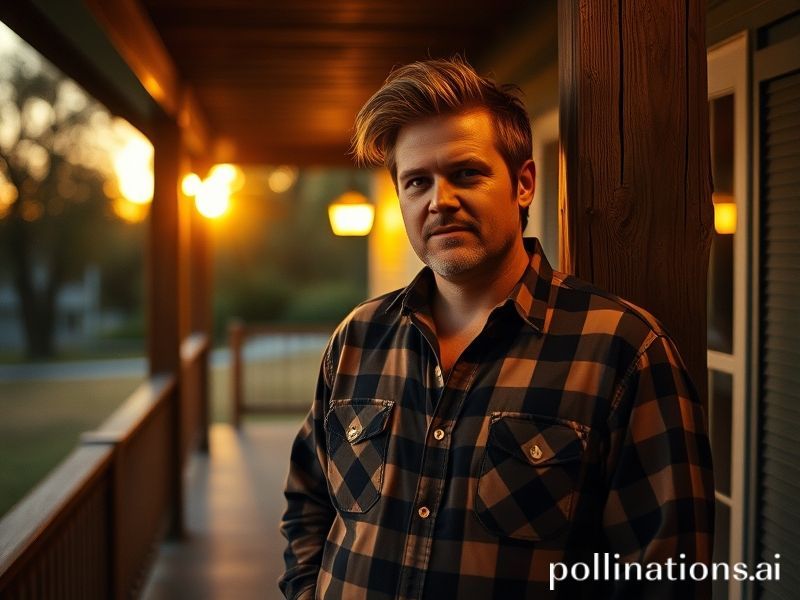From Bayou to Beijing: Theo Von’s Rise as the Planet’s Favorite Guilty Pleasure
Theo Von: How a Cajun-Fried Stand-Up Became Global Capital’s Favorite Court Jester
By the time the sun rises over Singapore’s harbor, a clip of Theo Von—shirt half-buttoned, eyes darting like a raccoon who just found the minibar—has already racked up a million views on Weibo. By lunch in Lagos, university kids are trading his punch-lines about rural rehab centers while dodging power cuts. And when New York finally wakes up, Spotify’s algorithm cheerfully serves “This Past Weekend” to hedge-fund analysts who spent yesterday shorting the very poverty Von jokes about. Somewhere in the metaverse the ghost of Diogenes is updating his LinkedIn: “Professional cynic seeking gig; competition too stiff.”
To the uninitiated, Von is just another American comic with a mullet and a podcast. But zoom out—way out—and he becomes a fascinating data point in the planetary comedy supply chain. His origin story is pure late-capitalist folklore: born in small-town Louisiana to a 70-year-old father and a mother who may or may not have been a cigarette, he graduated from MTV’s Road Rules to YouTube confessionals about addiction, only to emerge as the preferred bedtime storyteller for anxious millennials from Reykjavík to Riyadh. The arc is so perfectly absurd it feels algorithmically generated, perhaps by the same neural net that decides who gets a Netflix special and who drives Uber in Kuala Lumpur forever.
The global appeal is both flattering and vaguely ominous. Von’s comedy translates because it’s built on universal currencies: shame, family dysfunction, and the shared delusion that confessing your worst moments on a microphone absolves you—and by extension, us—of complicity in a burning world. His Louisiana drawl gets subtitled into 27 languages, which means that a joke about trading sexual favors for Adderall now doubles as a Rosetta Stone for late-stage decadence. UNESCO is reportedly studying the phenomenon under the file name “Accidental Soft Power.”
Meanwhile, the economic footprint is not trivial. Spotify paid him an undisclosed eight-figure sum—enough to purchase several actual bayous—while advertisers queue up to slap their VPNs and meal-powders onto his ad reads. In effect, Von has monetized the collective nervous breakdown of English-speaking humanity. If that sounds cynical, remember that the same week he signed his deal, the World Bank revised global poverty upward by 100 million souls. One half expects Von to open Episode 412 with, “So the global south and I both had a rough Q3…”
Of course, no planetary icon escapes the geopolitical funhouse. When Von riffed on China’s social-credit system, censors clipped the segment, yet bootleg audio still circulates on Shanghai dorm drives—proving that authoritarian regimes can ban the message but not the craving for irreverent catharsis. In Russia, fans splice his stories over dash-cam footage, creating a surreal genre scholars call “existential road comedy.” Even Tehran’s underground comedy cell has a Von impersonator, though the mullet is replaced by whatever haircut won’t get you lashed.
The darker punch-line? Von’s success coincides with a worldwide shortage of meaning. Traditional religions are hemorrhaging followers faster than a crypto exchange in winter, and politics has devolved into performance art. Into that vacuum steps a man in rattlesnake boots telling stories about his addict dad, and suddenly half the planet feels seen. If that strikes you as bleak, congratulations—you’ve located the gallows humor in the gallows.
So what does it mean that a self-described “rat king from the swamp” is now a transnational coping mechanism? Possibly that humor is the last exportable resource the United States hasn’t slapped tariffs on. Or that when the world ends, the final push notification will read: “Theo just dropped Part 2 of the meth-gator saga—tune in before the servers melt.”
Until then, we’ll keep streaming, laughing, and pretending the joke isn’t on us. After all, the planet’s on fire, but at least the commentary is fire too.







